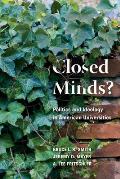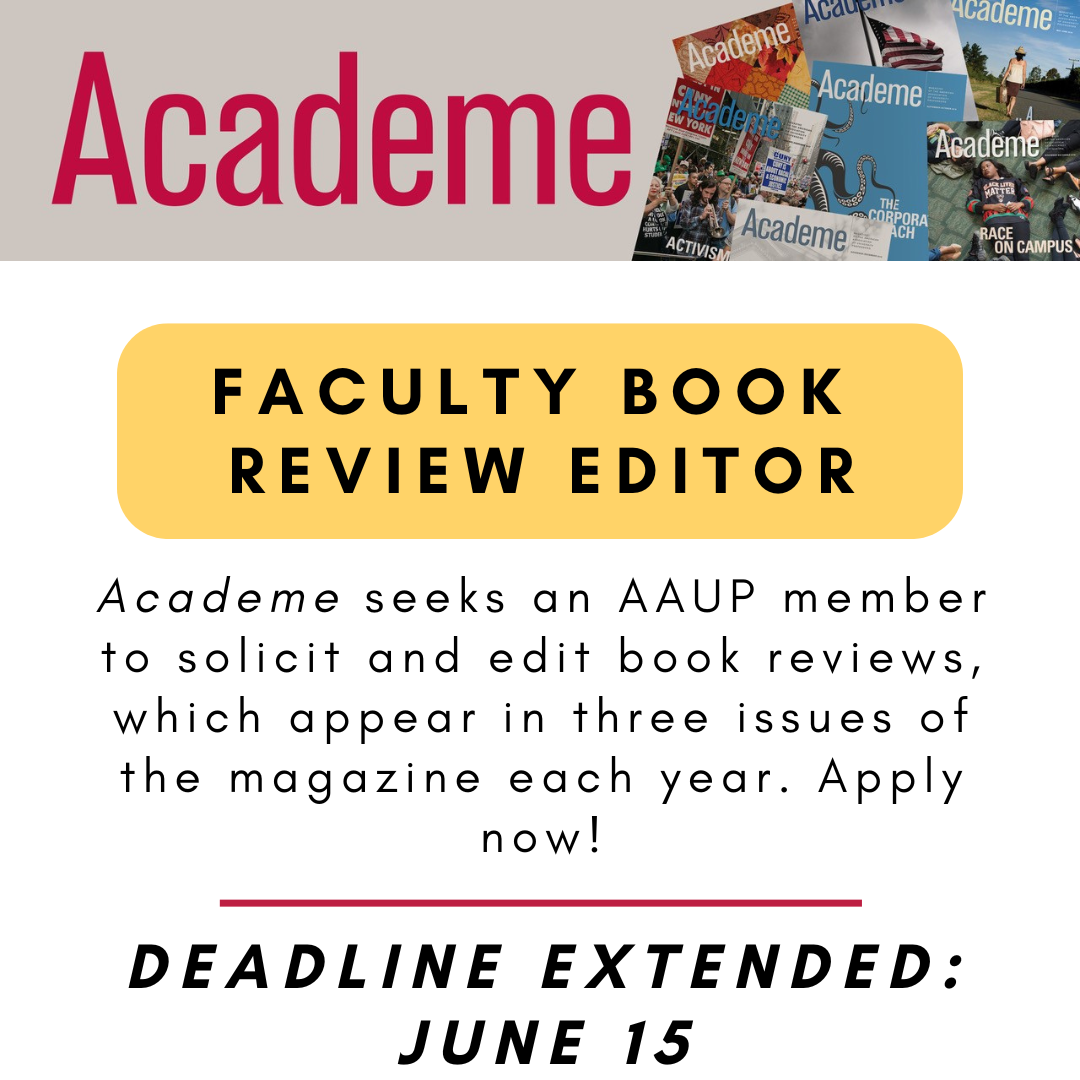- About
- Programs
- Issues
- Academic Freedom
- Political Attacks on Higher Education
- Resources on Collective Bargaining
- Shared Governance
- Campus Protests
- Faculty Compensation
- Racial Justice
- Diversity in Higher Ed
- Financial Crisis
- Privatization and OPMs
- Contingent Faculty Positions
- Tenure
- Workplace Issues
- Gender and Sexuality in Higher Ed
- Targeted Harassment
- Intellectual Property & Copyright
- Civility
- The Family and Medical Leave Act
- Pregnancy in the Academy
- Publications
- Data
- News
- Membership
- Chapters
Only Moderately Ideological
Closed Minds? Politics and Ideology in American Universities. Bruce L. R. Smith, Jeremy D. Mayer, and A. Lee Fritschler. Washington, D.C.: Brookings Institution Press, 2008.
Closed Minds? Politics and Ideology in American Universities sets out to examine whether ideological balance exists in American higher education and, in the process, offers one of the most comprehensive explorations of the topic undertaken to date. Within the context of a larger culture war, the debate over the alleged liberal politicization of college campuses has been conducted in large part by partisans on both sides. Drawing from a variety of individual political perspectives, authors Bruce L. R. Smith, Jeremy D. Mayer, and A. Lee Fritschler, approach the issue of campus ideology from a selfidentified moderate viewpoint, attempting, as they say, to bring a level of civility to the discussion.
Closed Minds? first examines the role that ideology has played in academia from a historical perspective. The book traces American higher education from the early colonial period, when classrooms served to prepare students to be engaged in civic life through service in teaching, ministry, or law, to the beginnings of modern research institutions. After establishing this foundation and discussing the liberal turn in academia in the 1960s, the book begins to explore the common assumption that college professors are “dangerous radicals and left-wing ideologues.” The authors detail the recent rise of conservative advocacy groups, such as David Horowitz’s Students for Academic Freedom, and their role in making ideological diversity a political issue at the state and federal levels. To begin to explore the realities of the issue, the authors use existing peer-reviewed and partisan research on the topic and the results of their own 2007 national survey of professors. They also draw on the results of focus groups and interviews conducted with undergraduate students as well as their own decades of experience working in higher education.
The authors of Closed Minds? come to the conclusion that academia is not, in fact, rife with leftist politics: students do not believe professors are trying to indoctrinate them, and professors do not believe that they are either being biased in their teaching or being discriminated against in the appointment process. Although conservative interest groups and activists such as Horowitz have helped raise the issue of political bias in the classroom, bias on campus is largely a nonissue, the authors argue. Similarly, recent efforts on the part of groups such as the AAUP to oppose a perceived right-wing conspiracy against academic freedom were “much ado about little,” according to the authors, as no effective conservative movement has emerged. In this brief but important part of their argument, the authors seem to avoid one plausible alternative explanation: it is possible that no coherent threat to academic freedom developed because efforts by the AAUP and other organizations to counter the attack were successful. Whether this is the case cannot be known, of course, but to assume that it is not is both wrong and overly dismissive of the work done by the AAUP and others.
Closed Minds? goes beyond simply contradicting claims of liberal political bias against the modern American university system. The authors argue that politics and serious discussion of political issues are, in fact, largely absent from the curriculum at a time when such discussions are most needed. They contend that Americans are generally averse to conflict and view political discussion as inevitably involving discord. They believe that colleges and universities, rather than helping to combat a trend, have acquiesced to forces that are eroding civic engagement in the United States. The book’s call to action is for institutions to incorporate the teaching of citizenship and practical politics in an effort to equip students to be effective citizens. While not advocating a particular political ideology, the authors believe that general education should include subjects such as moral and political philosophy, the history of democratic institutions, and the principles and practices of the rule of law. They argue that colleges and universities can do more to help students grapple with the “big issues” in life.
One of the book’s weaknesses stems from a methodological limitation to which the authors themselves allude but which they take no steps to correct. In the chapter “Much Ado about Little: Student Perspectives on Classroom Bias,” the authors explore how students view the issue of ideology in the classroom. Many of the conclusions reached in this chapter are based on the results of focus groups conducted with undergraduate students. The participants are identified as “high achievers” and as students who “accepted the notion that they were attending college to learn, to be stimulated by their professors, and to have their own views challenged by their professors and their fellow students.” The research sample biases findings in favor of a certain type of student—one whose cognitive and identity development may have evolved to tolerate challenges to views and ideas—and limits the value of these findings. Students of differing developmental stages may view the same classroom interactions differently, perhaps seeing bias where their peers do not. The conclusions drawn by the authors from their focus groups may hold true among these high-achieving students; without a more diverse sample, however, their findings regarding the student experience cannot be broadly applied.
Closed Minds? provides a thoughtful and thorough look at the role of ideology in U.S. higher education and convincingly shows that liberal ideology does not play an inappropriate role in academia. Further research on the topic is necessary, however. A better understanding of how a wide range of students perceives ideological bias—as well as how these perceptions affect their experience of higher education—is essential to understanding how better to engage students and teach vital lessons of civics and citizenship without crossing the line of indoctrination. Further research will also help to defend colleges and universities from the effect of legislation aimed at so-called ideological diversity. The role of ideology in academia is a perennial issue, and one that will surely be with us for years to come.
Darren L. Linvill is director of basic courses in the Department of Communication Studies at Clemson University. His e-mail address is [email protected].






